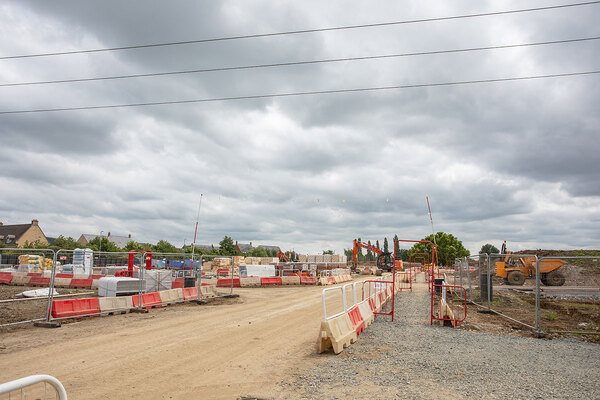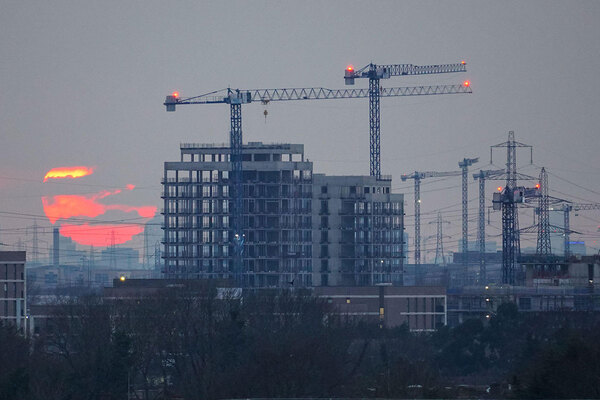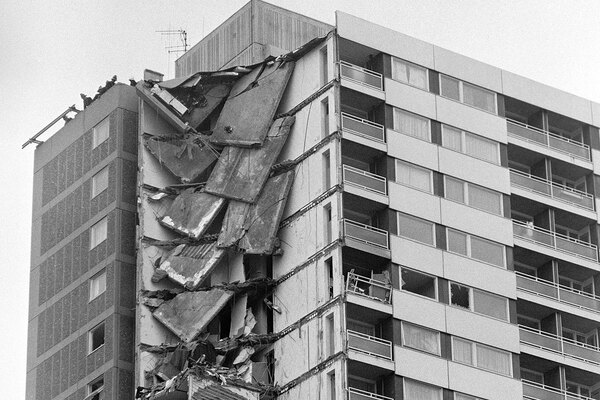Make the case for housing
Last year Inside Housing launched its House Proud, campaign to push housing up the political agenda in the run-up to the UK general election. Now it’s back to bang the drum for the sector as Scotland, Wales and Northern Ireland prepare to go to the polls. Emily Twinch and Isabel Hardman report

The locations may be different but there is a common danger. As campaigning ahead of May’s national elections hots up in Wales, Scotland and Northern Ireland, social housing is facing the squeeze.
Housing budgets have already been cut across the board and the immediate future appears far from bright for those who rely on social or affordable housing.
It is against this background that we launch House Proud - Devolved - a new stage in our campaign to ensure politicians and decision-makers in The Senedd, Holyrood and Stormont understand housing’s importance.
House Proud was a joint initiative from Inside Housing and the Chartered Institute of Housing, run ahead of the 2010 general election. Its aim was to shout about housing’s crucial contribution to every aspect of social policy.Almost 300 hundred people signed a petition in support of the campaign, the three main political parties included housing pledges in their election manifestos and their leaders pledged their support.
Now, the campaign seeks to prove housing’s case in the devolved nations.
Once again we will focus on the significant financial and practical benefits the sector delivers to areas including health, education, anti-social behaviour and sustainability.
To kick off, we explore the most pressing housing issues which those hoping to be elected on 5 May cannot afford to ignore. Plus we arm you with some key facts to presuade those hoping for your vote that housing matters and provide a case study showcasing the best of housing in each nation.
Scotland
- Housing and regeneration budget cut by 13 per cent from £448 million a year to £390.8 million a year
- Scottish councils must end homelessness by the end of next year
- Tough green and fuel poverty targets
Scottish housing providers face the harsh reality of a 13 per cent drop in the housing and regeneration budget in the next financial year.
It comes at a time when developers, housing providers and tenants are still struggling to recover from the recession.
The value of house building in the country plummeted 17 per cent from £2.4 billion in 2008 to £2 billion in 2009 compared with a fall of 7 per cent across England, according to figures from the Scottish Building Federation.
This was swiftly followed by a cut in housing association grant from £68,500 to £66,500 per home in June last year. The Scottish Government is considering reducing that to £40,000 per unit and removing the rural distinction, which currently allows rural providers £70,000 grant per home.
In its Scottish election manifesto the Chartered Institute of Housing states that a greater share of the Scottish Government’s provisional £2.5 billion capital budget for 2012/13 should be spent on housing. The health and wellbeing budget, which includes housing, is £623 million. It stresses that this will bring numerous knock on benefits, such as boosting the construction industry ‘and support better outcomes on health, education, crime reduction and the environment’.
Homeless people are among those who could lose out. Scotland has a target to end homelessness by the end of next year. Under pressure councils have, however, increasingly been relying on temporary accommodation to comply with the rules. Since 2002 the number of people in temporary accommodation in Scotland had risen 160 per cent - from 4,153 to 10,815, according to the report Progress and Drift, published on 25 February by homelessness charity Shelter.
Housing is also central to the Scottish Government’s target to cut carbon emissions by 42 per cent by 2020 and by 80 per cent by 2050. Homes are responsible for 33 per cent of carbon emissions in the country.
Fuel poverty is a major issue in Scotland, and the Scottish Government has set a statutory commitment to end fuel poverty ‘as far as is reasonably practicable’ by 2016.
‘We must invest more to tackle this now and deliver real efficiency savings,’ the Scottish Federation of Housing Associations says in a statement.
House Proud - Devolved will highlight this and other key issues for Scotland in the weeks leading to the 5 May elections.
Key facts
250,000
number of households in Scotland on council and housing association waiting lists
11,000
number of households in temporary accommodation per year**
20,000
number of new homes needed per year to accommodate household growth**
*Scottish Federation of Housing Associations
**CIH Scotland
Case study: the Assist project
What: Grampian Housing Association and Tenants First Cooperative Housing
Aim: The Assist project helps tenants with everything from budgeting to health issues
Set up in 2005, residents are referred to two full-time support workers by housing staff, and in its first five years Assist received more than 300 referrals.
Support workers carry out an assessment of the tenant and a support plan is drawn up for each, which will ensure all issues are addressed to help the resident remain in their home.
In a questionnaire on the effectiveness of the Assist project in 2009/10 residents reported they were grateful for help with taking care of the home and dealing with health and mental health issues.
Wales
- A huge drop in money available for building homes
- New housing powers, such as the power to abolish the right to buy, granted to Wales following a referendum
- Meeting the Welsh housing quality standard programme
These are unprecedented times for social housing in Wales. Last month social housing suffered a big cut when the Welsh Assembly Government slashed its grant budget for social homes by 30 per cent from £100 million to £69 million.
Then, last week the assembly won more power than ever before over housing policy following a referendum which will see it gain greater powers over the private rented sector, empty homes and the right to buy.
‘We want the next government to use its powers to develop appropriate solutions [to Wales’ housing problems],’ says Vikki Hiscocks, policy and public affairs manager at the Chartered Institute of Housing Cymru. She adds that CIH Cymru wants a national sustainable empty property fund, that could help bring empty homes back into use.
Tenants in Wales are counting the cost of years of underinvestment in social housing. Last week an Inside Housing investigation into the Welsh housing quality standard pinpointed a £429 million funding shortfall for eight Welsh authorities and found five out of 22 landlords local authority landlords did not have a single home that reached WHQS.
There is some cause for hope in the form of ongoing talks with the UK Treasury to free Welsh councils from the housing revenue account subsidy system, allowing them financial freedom and stopping the annual drain of £77 million housing revenue cash to Westminster every year.
Key facts
284,000
extra homes needed in Wales between 2006 and 2026*
101,000
extra homes needed in the social housing sector**
91,000
households on housing waiting list in February 2009*
*CIH Cymru
**Community Housing Cymru
Case study: Denbighshire Empty Homes Partnership
What: Denbighshire Empty Homes Partnership
Aim: To bring more than 800 empty homes back into use
Denbighshire Council teamed up with North Wales Housing Association to create the Denbighshire Empty Homes Partnership two years ago. Since then, 219 homes have been brought back into use including the Willows in Llangollen, a grade II listed building that had been an eyesore for 20 years.
The partnership’s efforts have addressed a lack of four-bedroom homes, allowing families to move out of cramped conditions.
The partners pay £25,000 a year to employ an empty homes officer.
Northern Ireland
- £70 million cut to the social development budget
- £100 million hole in Northern Ireland Housing Executive budget
- Cuts to housing benefit and Supporting People
The Budget is the issue on everyone’s lips in Northern Ireland. It was finally agreed by the province’s executive last Friday - but with furious disagreement. Social development minister Alex Attwood voted against the Budget, which contains a £70 million cut in funding for his department, which includes housing. It is not yet clear how this will filter down, but housing associations are already counting their pennies nervously as they eye cuts to housing benefit and Supporting People.
Clare McCarthy, chief executive of Clanmil Housing Association, says: ‘We think we can keep running Supporting People projects tightly by making efficiencies. But in the long term, yes, this could be a problem. Our issue is not with the capital funding needed to set up the scheme, but the revenue funding as well.’
So will candidates for the assembly make promises on housing as they approach the 5 May elections? House Proud - Devolved aims to make sure it will not become a neglected issue at hustings.
Most housing association leaders agree that Mr Attwood has put a great deal of effort into raising the profile of the sector. But Chris Williamson, chief executive of the Northern Ireland Federation of Housing Associations, says despite Mr Attwood’s passion for the sector, ‘I’m afraid housing will still not feature that highly on the agendas of most people in the run up to the election, though’. Time for that to change.
Key facts
£1.5 billion
the amount Northern Irish housing associations have contributed to the economy of the past 20 years*
2,500
the number of new social homes needed each year**
20,000
the number of peole in housing stress in Northern Ireland**
*The Northern Ireland Federation of Housing Associations
** CIH Northern Ireland
Case study: shared neighbourhoods
What: Shared neighbourhoods
Aim: To create communities in which Protestant and Catholic tenants live alongside one another
Clanmil Housing Association has created ‘shared future’ projects on neutral land under which tenants sign a compact pledging good behaviour and respect for one another’s values.
The 2,424-home association has developed two such estates in Belfast of 22 and 42 homes. Chief executive Clare McCarthy says: ‘We have to pay regard to housing need, so shared neighbourhoods can’t be 50 per cent Protestant or 50 per cent Catholic, as that could exclude people with higher need from one group.’








